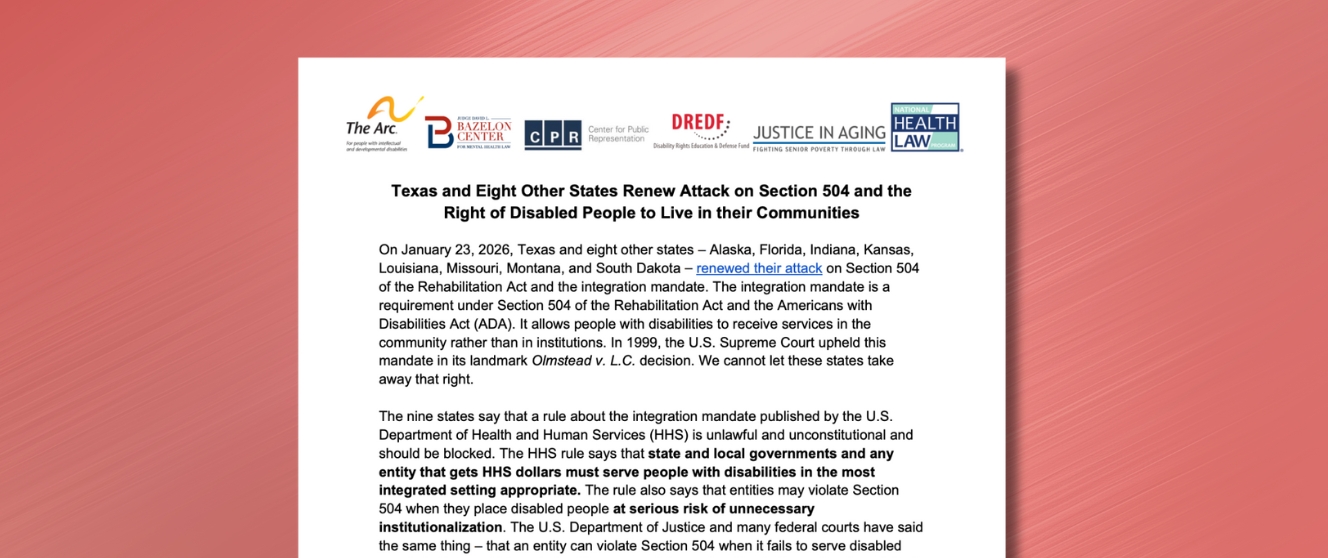
For Immediate Release — December 18, 2003
Contacts:
Kim Swain or Elissa Gershon, PAI: (510) 430-8033
Arlene Mayerson, DREDF: (510) 644-2555
Herb Levine, ILRCSF: (415) 543-6222
Advocates Cheer Progress Toward Community Services for San Franciscans with Disabilities
Judge Saundra B. Armstrong of the U.S. District Court, Northern District of California, today preliminarily approved settlement of a class action lawsuit against San Francisco and several State agencies brought on behalf of present and potential residents of Laguna Honda Hospital (LHH) and the Independent Living Resource Center of San Francisco (ILRCSF). “This settlement represents a positive first step in establishing the rights of people with disabilities, including seniors, to receive services in their homes and communities rather than in institutions,” says Kim Swain, lead counsel in the case from the Oakland office of Protection & Advocacy, Inc. (PAI), a non-profit agency that works to advance the rights of people with disabilities.
The lawsuit, Davis et al. v. California Health and Human Services Agency et al. was originally filed in July 2000 and is widely considered one of the most important cases seeking community integration of people with disabilities in the country. A hearing for final approval will be set.
In 1999, the U.S. Supreme Court ruled in Olmstead v. L.C. that the unnecessary institutionalization of individuals with disabilities when home and community-based care would meet their needs violates the Americans with Disabilities Act (ADA) and constitutes discrimination based on disability (527 U.S. 581 (1999)).
In the Davis lawsuit, LHH residents and the ILRCSF challenged policies and practices that discharge patients from San Francisco General Hospital (SFGH) to LHH without considering non-institutional, community-based alternatives as required by the ADA and other federal and state laws.
Plaintiff Jesse Fitchett spent more than six years at LHH but now lives in an apartment with part-time attendant care and other supports. “I was so happy to get out and have my freedom back and get better care,” Mr. Fitchett said, explaining that he was happy about the settlement because “I want to see other people get out and be able to live independently like I do.”
The settlement requires that San Francisco develop for the first time a system of assessment and discharge planning that allows people with disabilities and seniors the option of receiving supports and services in the community. By March 29, 2004, San Francisco will start a state-of-the-art Targeted Case Management (TCM) Program to screen, assess, and develop individual service and discharge plans for class members, and provide ongoing case management. Staff of the TCM Program will receive training on community living alternatives. In addition, San Francisco will conduct trainings for LHH residents on community living options, start a Community Advisory Committee with ILRCSF participation, and open a Community Resource Center at LHH.
“We’re pleased to see that the city is being responsive to its citizens,” commented Herb Levine, Executive Director of the ILRCSF. “Polls show that people would never go into nursing homes if they had the services necessary to help them stay in their community. For the first time, San Francisco will gather the information to determine what people need to successfully live in the community.”
The Davis case also settles longstanding deficiencies in the State Department of Mental Health’s Pre-Admission Screening and Resident Review (PASRR) program for individuals with psychiatric disabilities. The revised State assessment process will identify personal goals for housing, work, relationships, and health. State evaluators will consider whether the person’s goals and needs can be met with the full range of community-based alternatives to nursing home care. According to attorney Michael Stortz of PAI, “The settlement helps put an end to an evaluation process that steers too many people into nursing homes.”
In April 2003, the US Department of Justice (DOJ) sent a letter to San Francisco concluding its five-year investigation of LHH for practices that discriminate on the basis of disability. “The city continues to be in violation of the ADA and continues to fail to ensure that LHH residents are being served in the most integrated setting appropriate to their needs,” wrote Assistant Attorney General Ralph Boyd, Jr. to City Attorney Dennis Herrera. The DOJ letter concluded that LHH residents are not adequately assessed for community-based services either on admission or at discharge.
DOJ questioned the cost-effectiveness of San Francisco’s plan to spend $401 million for a 1,200-bed replacement facility, which will cost $127,000 per bed each year to operate, noting that “community integrated options could be provided at a fraction of the cost of staying in LHH.” Previously, the DOJ filed a friend of the court brief in support of the plaintiffs.
“People with disabilities should be given a choice about living options and community supports and not be forced to live in institutions,” said Arlene B. Mayerson, Directing Attorney of the Disability Rights Education and Defense Fund (DREDF), a non-profit law and policy center for disability civil rights in Berkeley that has co-counseled in the case. “By informing class members about community options and reassessing all LHH residents, San Francisco is taking a first step in recognizing the right to live free of institutionalization.”
The plaintiffs have the option to refile the portion of the case that seeks the actual provision of community services to people at SFGH and LHH after the new community-based assessment program is established and has been operating for six months. The need for community-based services and the capacity of San Francisco to provide such services will be determined based on the new assessment process.
“The settlement is a key step in helping guarantee the rights of people at these facilities, but it’s not the last,” said Ira Burnim, legal director of the Bazelon Center, a national legal advocacy group for people with mental disabilities. “We’re committed to seeing the city put in place viable alternatives to institutional settings.”
Plaintiffs are represented by a coalition: Protection & Advocacy, Inc. in Oakland, California; Disability Rights Education and Defense Fund, Inc. in Berkeley, California; the National Senior Citizens Law Center in Los Angeles, California; the Bazelon Center for Mental Health Law in Washington, D.C.; the Law Offices of Andrew Thomas Sinclair in Oakland, California; Howrey Simon Arnold & White, LLP, in Menlo Park, California; and the AARP Foundation Litigation, in Washington, DC.

